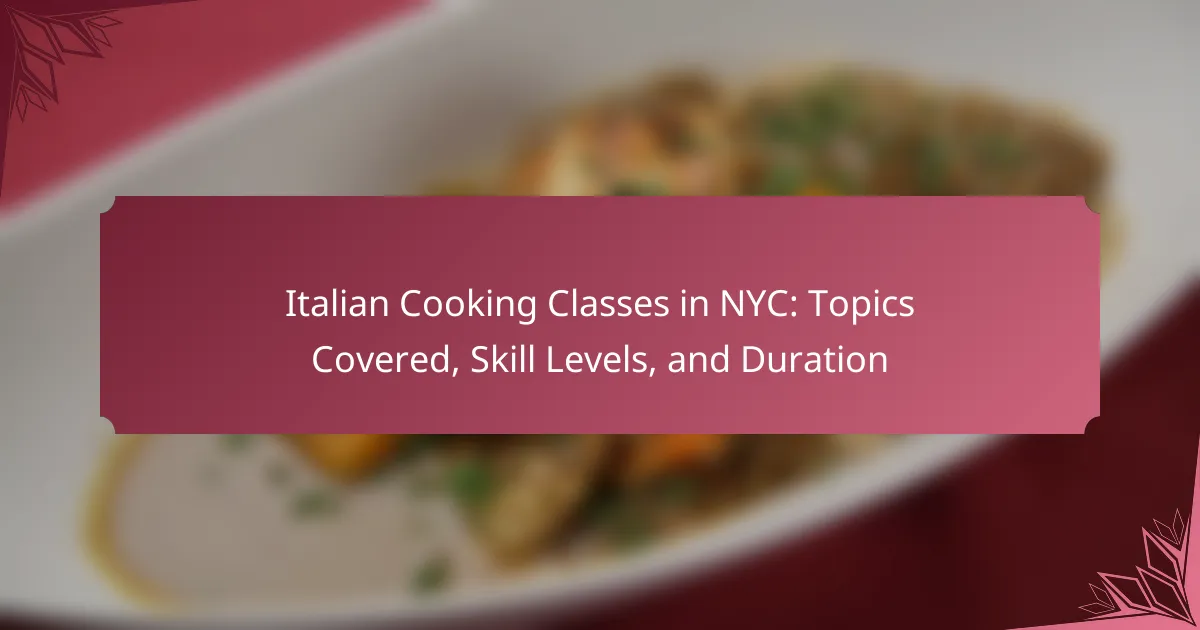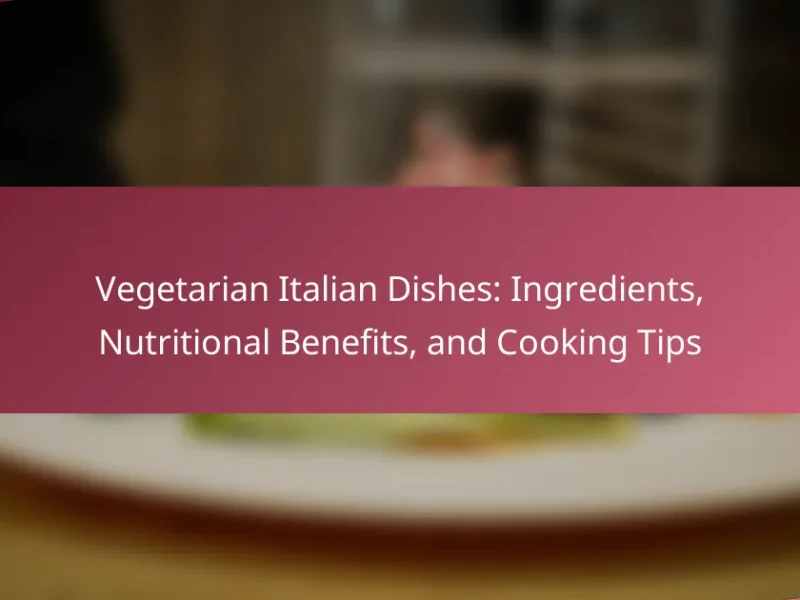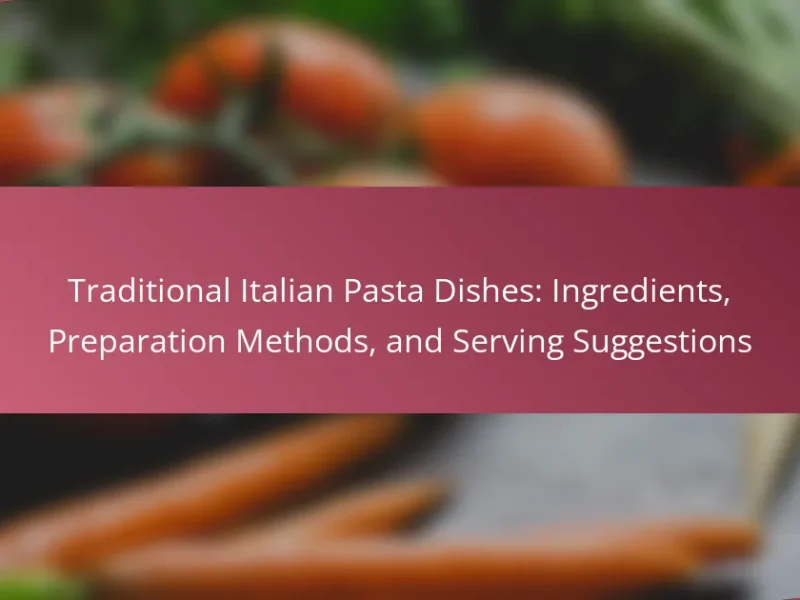Italian cooking classes in NYC are structured educational programs designed to teach participants how to prepare authentic Italian dishes. These classes cover essential topics such as pasta making, sauce preparation, and traditional cooking techniques, catering to skill levels from beginner to advanced. Typically lasting between two to four hours, the classes provide hands-on experience under the guidance of professional chefs, enhancing both cooking skills and appreciation for Italian cuisine. Participants will also learn about regional dishes, Italian ingredients, and dining etiquette, ensuring a comprehensive understanding of the culinary arts associated with Italy.

What are Italian Cooking Classes in NYC?
Italian cooking classes in NYC are educational programs focused on teaching participants how to prepare authentic Italian dishes. These classes often cover various topics, including pasta making, sauce preparation, and traditional cooking techniques. Skill levels range from beginner to advanced, accommodating different culinary experiences. Classes typically last from two to four hours, depending on the complexity of the recipes. Many cooking schools and culinary institutes in NYC offer these classes. Participants gain hands-on experience and learn from professional chefs. This immersive environment enhances cooking skills and cultural appreciation for Italian cuisine.
How do Italian Cooking Classes differ from other cooking classes?
Italian cooking classes focus on traditional techniques and regional recipes unique to Italy. These classes emphasize the use of fresh, high-quality ingredients, often sourced locally. Participants learn about the cultural significance of dishes, which adds depth to the cooking experience. Unlike other cooking classes, Italian classes often incorporate wine pairing and regional culinary history. Additionally, they may offer hands-on pasta-making sessions, a hallmark of Italian cuisine. This focus on authenticity and tradition sets Italian cooking classes apart from more generalized cooking classes.
What unique skills do these classes teach?
Italian cooking classes teach unique skills such as pasta-making, sauce preparation, and authentic ingredient selection. Students learn to knead, roll, and shape various types of pasta from scratch. Classes also cover traditional sauce recipes, focusing on balance and flavor. Participants gain knowledge of regional Italian ingredients and their uses. Knife skills are emphasized for efficient and safe food preparation. Additionally, students explore techniques for creating classic Italian dishes, enhancing their culinary repertoire. The hands-on experience fosters confidence in cooking and presentation skills.
What types of cuisine are typically covered in these classes?
Italian cooking classes typically cover a variety of Italian cuisines. These include regional specialties from Tuscany, Sicily, and Emilia-Romagna. Classes often focus on pasta making, risotto, and traditional sauces. Participants may also learn about Italian desserts like tiramisu and panna cotta. Additionally, classes may explore the art of pizza making and regional wine pairings. Each class aims to provide hands-on experience and authentic recipes. The diversity of cuisines reflects Italy’s rich culinary heritage.
What are the benefits of taking Italian Cooking Classes in NYC?
Taking Italian cooking classes in NYC offers numerous benefits. Participants enhance their culinary skills by learning traditional techniques. They gain knowledge about authentic Italian ingredients and dishes. Classes foster creativity in meal preparation and presentation. Social interaction occurs through group cooking experiences. Networking opportunities arise with fellow food enthusiasts. Classes often include cultural insights into Italian cuisine. Many programs provide hands-on experience, reinforcing learning. Overall, these classes enrich both cooking ability and appreciation for Italian culture.
How do these classes enhance culinary skills?
Italian cooking classes enhance culinary skills by providing hands-on experience and expert guidance. Participants learn essential techniques such as knife skills, pasta making, and sauce preparation. These classes also cover ingredient selection and flavor pairing, which are crucial for authentic Italian cuisine.
Through practice, students develop confidence in their cooking abilities. They receive immediate feedback from instructors, allowing for real-time improvement. Classes often include group collaboration, fostering teamwork and communication in the kitchen.
Research shows that hands-on cooking experiences significantly improve skill retention and culinary creativity. A study published in the Journal of Culinary Science & Technology highlights that practical learning environments enhance both knowledge and skill acquisition in culinary arts.
What cultural insights can participants gain from these classes?
Participants can gain a deep understanding of Italian culinary traditions from these classes. They learn about regional ingredients and cooking methods unique to Italy. The classes often cover the historical significance of various dishes. Participants explore the cultural context behind traditional recipes. This includes understanding family customs and seasonal celebrations related to food. Additionally, they gain insights into the role of food in Italian social life. The experience fosters appreciation for authentic Italian cuisine. Engaging with instructors who share personal stories enhances cultural learning.

What topics are covered in Italian Cooking Classes?
Italian cooking classes cover a variety of topics essential for mastering Italian cuisine. Participants learn about traditional Italian ingredients, cooking techniques, and regional dishes. Classes often include pasta making, sauce preparation, and the art of risotto. Students may also explore Italian baking, including pizza and bread. Additionally, lessons on wine pairing and Italian dining etiquette are common. Recipes may vary based on the region, showcasing Northern and Southern Italian specialties. Hands-on practice is a key feature, allowing students to apply what they learn in real-time. Overall, these classes provide a comprehensive foundation in Italian culinary arts.
What foundational techniques are taught in these classes?
Foundational techniques taught in Italian cooking classes include pasta making, sauce preparation, and ingredient selection. Students learn how to knead and shape fresh pasta from scratch. They also explore various traditional sauces, such as marinara and pesto. Classes emphasize the importance of selecting high-quality ingredients. Techniques for proper seasoning and flavor balancing are also covered. Knife skills, including chopping and dicing, are taught to enhance efficiency in the kitchen. Additionally, students practice cooking methods like sautéing and braising. Each technique is demonstrated by experienced chefs to ensure proper understanding and execution.
How do students learn about pasta making?
Students learn about pasta making through hands-on cooking classes. These classes typically include demonstrations by experienced chefs. Students practice techniques such as kneading and rolling dough. They also learn to shape various pasta types, like fettuccine and ravioli. Instruction often covers ingredient selection, including flour and eggs. Classes may incorporate cultural history related to pasta. Students gain practical experience in a supportive environment. Many classes are structured for different skill levels, from beginners to advanced cooks.
What role does sauce preparation play in the curriculum?
Sauce preparation is a fundamental component of the culinary curriculum in Italian cooking classes. It teaches essential techniques and flavor profiles that are vital to Italian cuisine. Mastering sauces enhances students’ understanding of balance in dishes. Students learn to create classic sauces like marinara and pesto. These skills are crucial for developing a well-rounded culinary foundation. Sauce preparation also emphasizes the importance of fresh ingredients and proper cooking methods. This hands-on experience fosters creativity and confidence in students. Ultimately, sauce preparation is integral to mastering Italian cooking.
Are there specialized topics available in Italian Cooking Classes?
Yes, there are specialized topics available in Italian cooking classes. These classes often focus on specific cuisines from different regions of Italy. Topics may include pasta making, traditional sauces, and regional desserts. Some classes emphasize vegetarian or vegan Italian dishes. Others may cover wine pairing with Italian meals. Specialized classes might also explore historical Italian cooking techniques. Each topic provides a unique culinary perspective. This variety caters to different skill levels and interests.
What advanced techniques can students explore?
Students can explore advanced techniques such as sous vide cooking, fermentation, and molecular gastronomy. Sous vide allows precise temperature control for cooking proteins. Fermentation enhances flavors and preserves ingredients, like making homemade pickles or sourdough bread. Molecular gastronomy involves using scientific principles to create innovative dishes, such as spherification and foaming. These techniques elevate traditional Italian dishes and introduce modern culinary concepts. Mastering these skills can significantly enhance a student’s culinary repertoire and creativity in the kitchen.
How do classes address regional Italian cuisines?
Classes address regional Italian cuisines by focusing on specific dishes and cooking techniques unique to each region. They often highlight local ingredients and traditional methods. For example, a class may teach how to prepare Neapolitan pizza using specific flour types and cooking temperatures. Another class might explore the rich sauces of Emilia-Romagna, emphasizing the use of fresh pasta. Classes often include discussions on the historical and cultural significance of each dish. This approach helps students appreciate the diversity of Italian cuisine. Many classes incorporate hands-on cooking experiences to reinforce learning. Students leave with practical skills and knowledge of regional nuances.
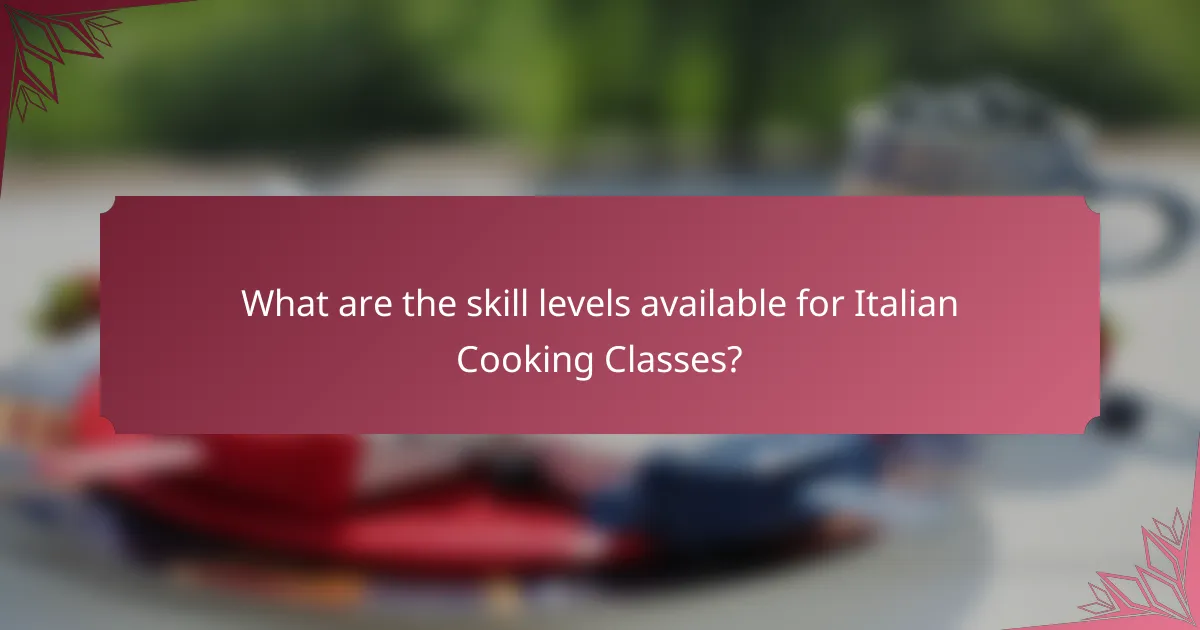
What are the skill levels available for Italian Cooking Classes?
Italian cooking classes typically offer three main skill levels: beginner, intermediate, and advanced. Beginner classes focus on basic techniques and simple recipes. Intermediate classes build on foundational skills with more complex dishes. Advanced classes emphasize refined techniques and gourmet cooking. Each level is designed to cater to different experience and knowledge bases.
What options are available for beginners in these classes?
Beginners in Italian cooking classes in NYC have several options. These options typically include hands-on cooking sessions, basic ingredient preparation, and introductory techniques. Classes often cover fundamental recipes such as pasta making, pizza preparation, and sauces. Many classes also focus on essential knife skills and food safety practices. Additionally, some programs offer themed classes like regional Italian cuisine. Beginners can choose classes based on their schedule, with options ranging from one-time workshops to multi-week courses. The availability of online classes has also increased, providing flexibility for beginners.
How do instructors cater to novice cooks?
Instructors cater to novice cooks by providing structured guidance and support. They often start with basic cooking techniques. This includes knife skills, ingredient preparation, and cooking methods. Instructors use simple recipes to build confidence. They encourage hands-on practice to reinforce learning. Personalized feedback helps novices improve their skills. Classes are designed to be interactive and engaging. Instructors also create a supportive environment to foster learning. This approach ensures that novice cooks feel comfortable and motivated.
What basic skills are emphasized for beginners?
Basic skills emphasized for beginners in Italian cooking classes include knife skills, ingredient preparation, and basic cooking techniques. Knife skills involve proper handling and cutting techniques for various ingredients. Ingredient preparation includes washing, peeling, and chopping vegetables and herbs. Basic cooking techniques cover sautéing, boiling, and simmering. These foundational skills are crucial for creating authentic Italian dishes. Mastery of these skills enhances overall cooking confidence and efficiency.
What opportunities exist for advanced cooks in Italian Cooking Classes?
Advanced cooks in Italian Cooking Classes have opportunities to refine their techniques and expand their culinary repertoire. They can engage in specialized workshops focused on regional Italian cuisines. Classes often cover advanced topics such as pasta-making, sauce preparation, and authentic ingredient sourcing. Participants may also learn about food presentation and plating techniques. Networking with professional chefs is another benefit, providing insights into the culinary industry. Opportunities for hands-on experience with high-quality ingredients enhance skill development. Advanced classes may also offer certification upon completion, adding value to a cook’s credentials. These elements collectively contribute to a comprehensive learning experience for advanced cooks.
What specialized classes are available for experienced chefs?
Specialized classes available for experienced chefs include advanced pasta-making, regional Italian cuisine, and wine pairing. Advanced pasta-making focuses on techniques for creating various pasta types and sauces. Regional Italian cuisine classes explore specific areas of Italy, emphasizing traditional dishes and cooking methods. Wine pairing classes educate chefs on selecting wines that complement Italian dishes. These classes enhance skills and broaden culinary knowledge.
How do advanced classes challenge skilled participants?
Advanced classes challenge skilled participants by introducing complex techniques and advanced culinary concepts. These classes often include intricate recipes that require precision and creativity. Participants must adapt to high-pressure cooking environments. They are encouraged to experiment with flavors and presentation. Advanced classes also emphasize the importance of ingredient sourcing and quality. Participants may work with seasonal and specialty ingredients not commonly used in basic classes. Additionally, these classes often involve collaboration and teamwork, pushing participants to communicate effectively. The overall goal is to refine skills and enhance culinary artistry.
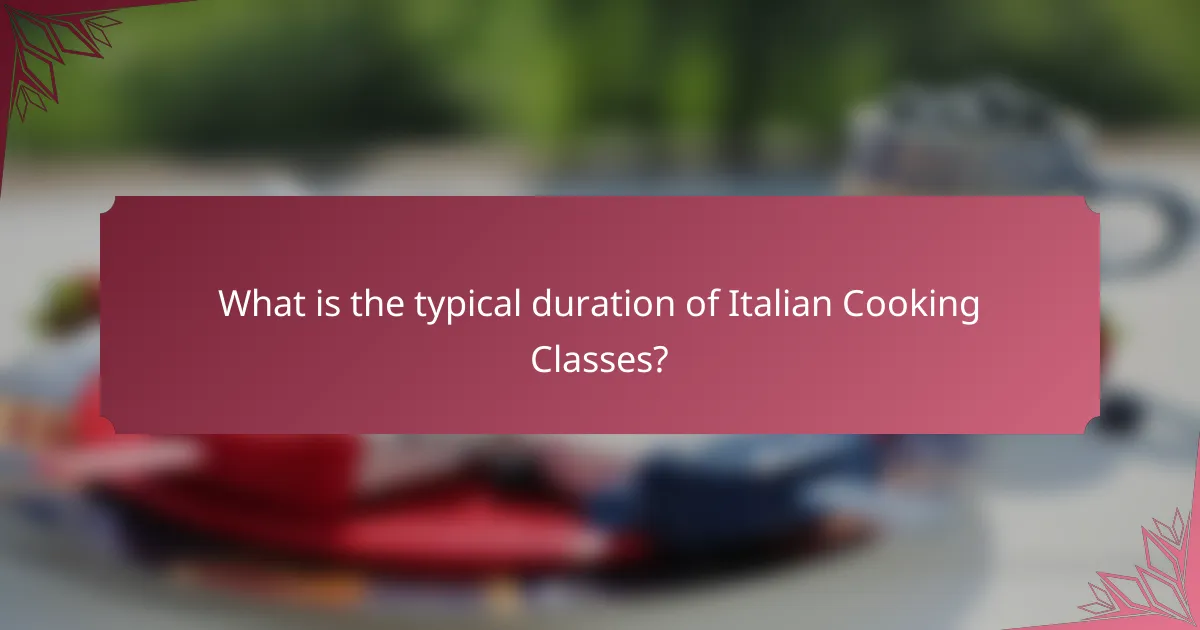
What is the typical duration of Italian Cooking Classes?
Italian cooking classes typically last between two to four hours. This duration allows participants to engage in hands-on cooking while learning essential techniques. Classes often include preparation, cooking, and tasting phases. Many institutions offer sessions that fit within this timeframe to accommodate various schedules. The structure is designed to maximize learning and enjoyment in a limited time.
How long do individual classes last?
Individual classes typically last between 2 to 4 hours. This duration allows for comprehensive instruction and hands-on practice. Many classes are designed to cover specific recipes or techniques within this timeframe. For example, a pasta-making class may take around 3 hours to ensure participants learn the process thoroughly. The exact length can vary based on the cooking school and the complexity of the class.
What is the typical structure of classes over multiple sessions?
The typical structure of Italian cooking classes over multiple sessions includes a sequential learning format. Each session builds on skills learned in previous classes. Classes often begin with an introduction to basic techniques and ingredients. Subsequent sessions introduce more complex recipes and cooking methods. Participants usually engage in hands-on cooking activities. Instructors provide guidance and feedback throughout each class. Classes may also include discussions on Italian culinary traditions and regional specialties. This structured approach enhances skill development and culinary knowledge over time.
Are there intensive courses available for faster learning?
Yes, there are intensive courses available for faster learning in Italian cooking. These courses are designed to accelerate skill acquisition. They often condense content into a shorter timeframe. For example, many classes last a few days to a week. Participants can learn various techniques in a focused environment. Some programs even offer hands-on experience with professional chefs. This format allows for immediate application of skills. Intensive courses are popular among those seeking quick mastery.
What is the format of these intensive Italian Cooking Classes?
The format of these intensive Italian Cooking Classes typically includes hands-on cooking sessions. Participants engage in practical cooking exercises to learn various techniques. Classes often cover a range of topics, including pasta making and sauce preparation. Instruction is delivered by experienced chefs who provide guidance and feedback. Sessions usually last several hours, allowing ample time for practice. Group sizes are often kept small to ensure personalized attention. Some classes may also include tastings of the prepared dishes. This structure enhances learning and skill acquisition in Italian cooking.
How do intensive classes compare to regular courses in terms of content?
Intensive classes cover content more rapidly and comprehensively than regular courses. They condense the material typically spread over a longer period into a shorter timeframe. This allows for an in-depth exploration of topics such as techniques, ingredients, and culinary history. Regular courses often introduce these topics at a slower pace, allowing for more gradual learning. Intensive classes may also include additional hands-on practice and personalized instruction. This structure is designed for students seeking to acquire skills quickly. Research indicates that students in intensive programs often retain knowledge better due to the immersive experience.
What tips can help maximize the experience in Italian Cooking Classes?
To maximize the experience in Italian cooking classes, engage actively with the instructor. Asking questions enhances understanding of techniques and ingredients. Practice hands-on cooking during the class to reinforce skills. Collaborating with classmates fosters a supportive learning environment. Take notes on recipes and techniques for future reference. Arrive prepared with an appetite and an open mind. Familiarize yourself with Italian cuisine basics beforehand to enhance your learning. Lastly, savor the dishes you create to appreciate the culinary journey.
Italian cooking classes in NYC are educational programs designed to teach participants how to prepare authentic Italian dishes, covering topics such as pasta making, sauce preparation, and traditional cooking techniques. These classes cater to various skill levels, from beginner to advanced, and typically last between two to four hours. Participants gain hands-on experience and cultural insights about Italian cuisine, enhancing their culinary skills and appreciation for regional specialties. The curriculum includes foundational techniques, specialized topics, and advanced methods, providing a comprehensive learning experience.
